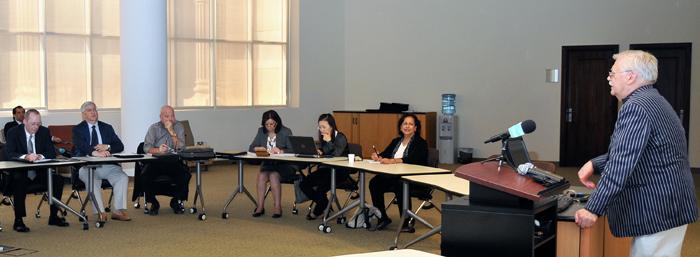- About
- Admissions
- Study at AUS
- Prospective Students
- Bachelor's Degrees
- Master's Degrees
- Doctoral Degrees
- Admission Publications
- International Students
- Contact Admissions
- Grants and Scholarships
- Sponsorship Liaison Services
- Testing Center
- New Student Guide
- File Completion
- New Student Orientation
- Payment Guide
- Executive Education
- Students with Disabilities
- Academics
- Life at AUS
- Research
- Contact Us
- Apply Now
- .

Workshop on the Global University at AUS
American University of Sharjah (AUS) held a two-day Workshop on the Global University that concluded today. The symposium was attended by scholars from the region and beyond to discuss the changing nature of the university and the emergence of the global university.
Globalization has led to the growth of knowledge communities around the world, mirroring the rise of centers of global finance hubs in previous decades. In the Middle East and Asia, the demands of the knowledge-based economy have led to the opening of new indigenous universities and new branch campuses and partnerships with universities in Europe and North America. The growth of these universities has altered the traditional role of the university further, increasing the emphasis on career-oriented courses of study and on technical disciplines. Similarly, the development of new partnerships has contributed to the creation of what has been referred to as the global university, altering the relationship between the university and the community it serves.
The event shed light on the dynamic of the global university and began with an opening panel discussion on "Perspectives on Universities in the Gulf," with a presentation by Dr. Ivan Szelenyi, Provost of New York University Abu Dhabi. Dr. Szelenyi talked about "Global Education: Is it the response to challenges US tertiary education is facing?"
Dr. Mark Rush, Dean of the College of Arts and Sciences (CAS) then spoke about the "Perspective of Universities in the Gulf." Dr. Rush spoke about the shift in the nature of university education and discussed the situation in the US where the country is facing rising costs for an expensive model of education, with the cost outpacing inflation. Student debts are at an all-time high and the tension now lies between the cost and value of this model. In several regions of the world, rising costs to governments of providing tertiary education, coupled with rising tuition fees, have led universities to explore alternative models of instruction including the growth of massive open online courses MOOCs) in the United States.
Over the course of two days, the workshop featured keynote papers from established scholars in the field and papers from young scholars. It aimed to serve as the beginning of a multi-year research project on the origin and future of the global university and its role in the Gulf.
According to Kevin Gray, Assisstant Professor in International Studies, "The expansion of university education in the Gulf and the development of the global university have not been without their controversies. This workshop, which will serve as part of a larger research project, aims to investigate the effects of the growth of university education in the region, its historical origins, and potential future."
Symposium themes included technology, corporatism and the making of global universities; the history of the modern university with special attention to Eurasia and the Arabian Gulf; navigating language, gender and culture in the global university; postcolonial positions: hybridity, new knowledge in the global university; and defining the boundaries of the global university.

